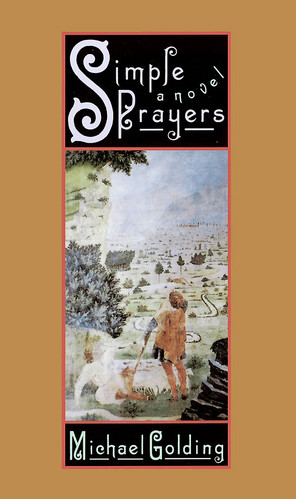 Simple Prayers by Michael Golding needs to be unwrapped slowly, savored, tasted, smelled, rolled around on the tongue to catch both the bitter and the sweet. Then again, comparing this novel to a complex confection, a tired cliche, doesn’t do it justice.
Simple Prayers by Michael Golding needs to be unwrapped slowly, savored, tasted, smelled, rolled around on the tongue to catch both the bitter and the sweet. Then again, comparing this novel to a complex confection, a tired cliche, doesn’t do it justice.
“Pansies, chrysanthemums, violets, daisies, lilies, lilacs, pinks. Their perfume sent wild ribbons into the air, and their color woke the rabbits.
Spring had finally come to Riva di Pignoli.
And flowers were just the beginning.”
The novel takes place in a small island near Venice in the fourteenth century, a setting that is both dreamlike and throbbing with the realities of life. A bloated body washes up on shore and is buried in secret, a mean soap maker and her ethereal daughter dance together in dependency and thoughts of murdering each other, the town lover and the town monk both try to overcome their passion for a mysterious madonna-like stranger, and a young farmer is seduced by a spoiled, pudgy rich girl, surprised when his initial revulsion is turned into love and desire.
This book is all about the rustic rhythms and the relationships of the villagers and the magic that can come with both love and fear. The characters and the setting are vivid, the writing is lyrical and literary, the story is enchanting and the plot twists and turns in ways that though surprising leave you very satisfied in the end. Golding has a good handle on human nature, with all of its mannerisms, all of its longing, all of its ambivalence.
That said, this book may not be for everyone. It is a strange blend of fairy tale and apocalypse. Some may be disappointed by the way the author takes chances and doesn’t stick to the expected. Simple Prayers definitely falls into the realm of magic realism, and as you are reading it you have the strange feeling as though you yourself have washed up on a quirky shore, ready to roll up your sleeves and let the future of the village take you where it will, no matter how strange, how sad, how shocking.
Related Articles:
A Cup of Friendship by Deborah Rodriguez
Uppity Women of Shakespearean Times

